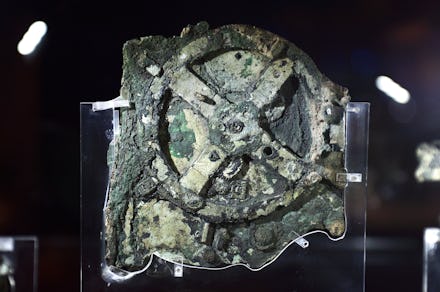Antikythera Mechanism, World's First Computer, May Have Been Used to Predict the Future

The world's oldest computer was probably used as a teaching aid and a mechanism to predict future astronomical events, according to new research.
This ancient computer is called the Antikythera Mechanism. Pearl divers discovered it in the Mediterranean Sea in 1900, and scientists have been studying it for decades.
The mechanism is extraordinarily advanced for its time. It dates all the way back to 60 BC, but something of its equivalent technical level doesn't appear again until over 1,000 years later.
The mechanism is badly corroded and several pieces are missing, but scientists have figured out a few things about it. It's not a programmable computer like the ones we're used to, but it's considered the first analog computer. The ancient Greeks likely used it to track the positions of celestial objects. It works similar to a clock, with hands for the sun, moon and planets, and a knob and crank for a user to rotate the hands.
The latest discovery: A new X-ray scanning analysis of the mechanism has revealed a series of inscriptions on the side that reads like an information sign by a museum display. Those inscriptions have revealed more about the mechanism's purpose.
"It was not a research tool, something that an astronomer would use to do computations, or even an astrologer to do prognostications, but something that you would use to teach about the cosmos and our place in the cosmos," Alexander Jones, a professor of the history of ancient science at New York University, told the Associated Press. "It's like a textbook of astronomy as it was understood then, which connected the movements of the sky and the planets with the lives of the ancient Greeks and their environment."
The research team described it as a "philosopher's instructional device."
Why it matters: Learning more about the Antikythera Mechanism could help us better understand ancient Greece and how our understanding of astronomy has evolved over time.
"Now we have texts that you can actually read as ancient Greek. ... What we had before was like something on the radio with a lot of static," Jones told the Associated Press. "It's a lot of detail for us because it comes from a period from which we know very little about Greek astronomy and essentially nothing about the technology, except what we gather from here. So these very small texts are a very big thing for us."